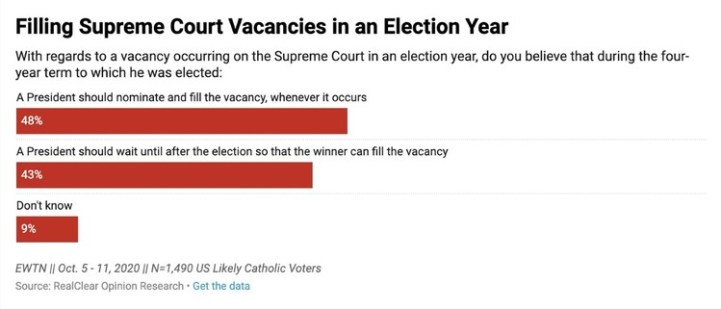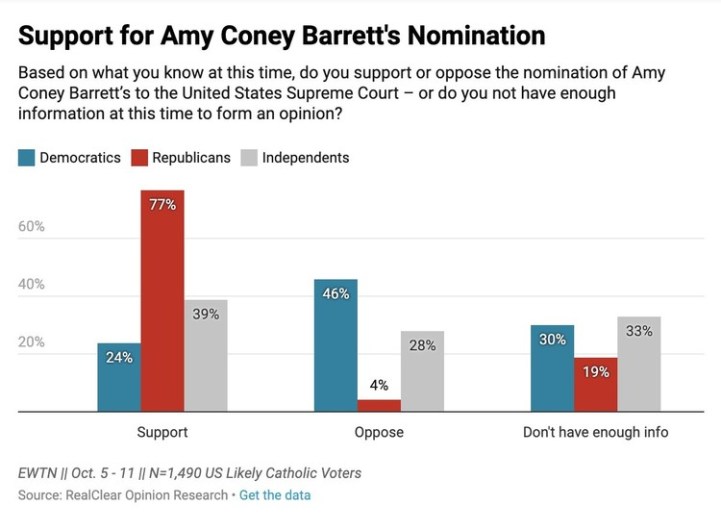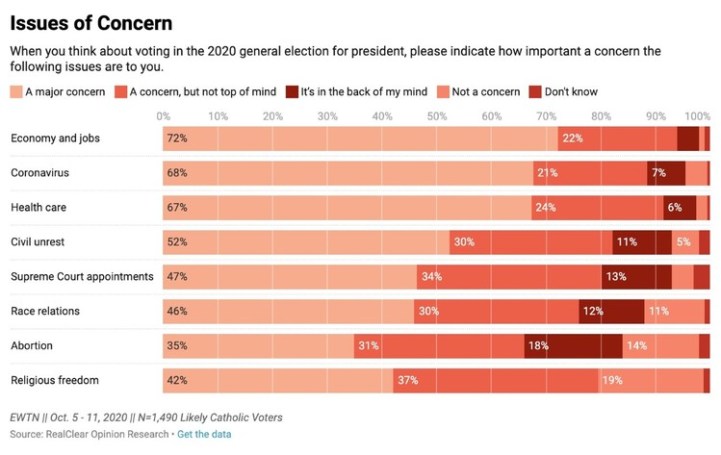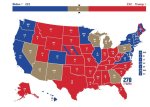As public opinion polls show Joe Biden handily ahead in his quest to become the second Roman Catholic candidate elected president of the United States, Catholic voters have emerged as perhaps the key demographic cohort in the 2020 campaign. Not a voting bloc, but a representation of America itself.
Catholic voters — increasingly non-white, trending more liberal in their younger ranks, and intensely concerned about jobs, the coronavirus, and health care — prefer Biden over President Trump by 12 percentage points, according to the latest RealClear Opinion Research survey done in concert with Catholic television network EWTN. Biden’s lead over Trump is unchanged from the last RCOR/EWTN survey conducted in late September.
These findings comport with other recent surveys of Catholic voters, notably by the Pew Research Center. They also show Catholics, who constitute about one-fourth of the U.S. electorate, to be favoring Biden slightly more than the overall electorate, as Biden’s lead over Trump in the current RCP national polling average has been about nine points.
“In 2020, the diverse Catholic electorate is a reflection of an increasingly diverse American electorate,” said John Della Volpe, the polling director of RealClear Opinion Research. “Similar to national tracking polls, Biden’s standing — in many cases, a 20-plus-point advantage — among Catholic women, Hispanics, independents, and voters under 55 (especially millennials and Gen Z) make it very challenging for Trump to narrow the gap in the final days.”
This survey of 1,490 likely Catholic voters, conducted Oct. 5-11, is the last in a four-part series seeking to contextualize the Catholic vote in America. All four polls fleshed out previous findings showing how generational differences and ethnicity drive significant ideological differences within the broad American Catholic portion of the electorate. The latest poll explored the relevance of religious faith to voting behavior and attitudes toward issues including the candidates’ popularity, trust in the media and the recent Supreme Court nomination of Amy Coney Barrett.
All four surveys showed the ideological split between (more liberal) younger Catholics and (more conservative) older Catholics. Similar dichotomies exist with Hispanics, who are much more Democratic than non-Hispanic white Catholics. A similar dynamic exists between casual Catholics and those who attend Mass most regularly: As a rule, those most active in their parishes and who accept church teachings on abortion and other issues are more likely to vote Republican and much more supportive of President Trump than their more lax co-religionists.
In the waning days of the 2020 election, this tension is personified by the candidacy of the pro-choice Democratic presidential nominee and Trump’s super pro-life surrogate, the federal jurist tapped by the president for the Supreme Court. While each side pinned hopes on Judge Barrett’s nomination to rally its base, the new poll, completed on the eve of her Senate confirmation hearings, suggests it has changed few minds. Nearly half of the Catholic voters surveyed say a Supreme Court vacancy should be filled whenever it happens:

Although this question is heavily influenced by political affiliation — 84% of Trump voters favor a president filling the vacancy “at any time” while 69% of Biden voters believe a president should wait — neither stance quite describes how Senate Democrats and Republicans have behaved on this issue. Remember Merrick Garland? In other words, politicians on Capitol Hill aren’t the only ones who practice situational ethics. Voters do, too.
As for Amy Barrett herself, a sizeable plurality of like Catholic voters (46%) support her nomination to the Supreme Court, with only 28% opposed (27% indicated that they lacked enough information to make a judgment). As one would expect, Catholic Republicans overwhelmingly support the nomination, while Democrats oppose it by a margin of nearly 2-1. Independents support her by 39%-28%, with one-third telling us they don’t have enough information at this time.

The poll also shows that Catholic voters are highly sensitive to any hint of anti-Catholic animus toward Barrett. This is to be expected, but unlike most questions in this poll there is a negligible partisan difference. So on the topic of religious tolerance, score one for the GOP: Trump’s view is the voters’ view, too. On the other hand, abortion, which the Trump camp hyped in hopes of galvanizing the conservative base, seems to be something of a dud.
On Roe v. Wade, a plurality (45%) of likely Catholic voters favor upholding the 1973 Supreme Court case. One-quarter of Catholics want abortion ruled unconstitutional, a highly unlikely outcome, while 18% say they’d favor having the high court simply vacate Roe and send the issue back to the states. There is no gender gap on this issue and it’s worth emphasizing that support for keeping Roe is high even among Catholics who attend Mass daily. Simply put, this election isn’t about abortion. It’s about the economy and the coronavirus. It’s a referendum, as presidential elections usually are, on the incumbent and his handling of the pressing national issues of the day:

Interest in the top three subjects dwarfs concern about social issues or the Supreme Court. Considering the medical challenges posed by COVID-19 and the lockdown that following the outbreak of the pandemic, these three priorities are tightly interrelated. Even before the president contracted the virus himself, he wasn’t doing so well on this topic. In September, the RealClear-EWTN poll found that 47% of likely Catholic voters rated Trump’s handling of pandemic as “poor,” with another 10% choosing “no so good” — markedly worse than Joe Biden’s marks.
Is there any positive news for the president in this survey of Catholics? Perhaps. His job approval rating among likely Catholic voters is 47%. This is slightly higher than his approval nationally, which stands at 44.8% in the RCP average. And it’s significantly higher than the percentage of Catholics who say they plan to vote for him:

The matter of temperament may be as significant as Trump’s handling of the pandemic — and, again, the two questions are entwined. Viewing the 2020 election with a wide-angle lens, the choice between the two candidates is taking place not only in a time of hyper-partisanship, but of severe political polarization over the issues and the nation’s dominant political personalities. Even Catholics who are doctrinally conservative and politically rightward leaning are tested by Trump’s public and private behavior; devout Catholics who are politically liberal have long looked with dismay as the Democratic Party has written them off over their pro-life views.
One influential liberal, John Carr, director of the Initiative on Catholic Social Thought and Public Life at Georgetown University, made news recently by explaining his support for Joe Biden. “For years, I have said that I often feel politically homeless as a pro-life, social justice, consistent-ethic Catholic,” he wrote in the Jesuit journal America. “This is not a badge of honor. If we Catholics are politically homeless, it is because we have failed to build a home. Sometimes we cannot even find shelter.”
Then Carr got to the point of his article. “I believe Mr. Trump’s character, lack of integrity and record on racism and Covid-19, among other matters, constitute ‘morally grave reasons’ to oppose his reelection and that Mr. Biden has the ‘character and integrity’ to lead our nation and is ‘more likely to pursue other authentic human goods,’ ” Carr wrote. “I will vote for Mr. Biden for what he can do to help us recover and heal, lift up those left behind, ensure healthcare for all and treat immigrants and refugees with respect.”
Responding to a query from RealClearPolitics, conservative Catholic physician and activist Grazie Pozo Christie offered a rebuttal. “As a Catholic, I will vote confidently for President Trump based on a long list of accomplishments his administration has taken to promote human life and dignity, religious liberty, and the common good,” she wrote.
Dr. Christie went through the litany of Trump actions she said bolsters his credentials: two (perhaps three) conservative Supreme Court justices, his attendance at the annual March for Life, his defense of the Little Sisters of the Poor, his support of late-term abortion bans. “I’m focused on actions, not words, however beautiful or brutish,” she added. “As a mother of parochial school children, this administration’s eager support of faith-based entities’ inclusion in the CARES Act meant the world to me. Joe Biden, for his part, has embraced the Democratic Party’s extreme positions on abortion [and] selected an unapologetic anti-Catholic as his running mate. …
“Homelessness often leads to confusion and desperation. John Carr feeling politically ‘homeless’ seems a case in point. He’s trying to find a home where, sadly, his views on ‘morally grave’ issues are no longer welcome.”
For now, however, the majority of Catholic voters are comfortable with the Democrats’ 2020 presidential nominee. Could that change between now and Election Day? Theoretically, yes, but the Trump talking point about Biden being in office for 47 years reveals how difficult that would be: He’s the old pair shoes voters already know. That’s a much different appeal than Barack Obama’s charisma — or Trump’s star power, for that matter — but it may fit the moment.
Again, however, the gap between Trump’s job approval rating among Catholics and those who say they are voting for him is fascinating. It suggests one of several possibilities, the most obvious one being that voters are simply exhausted by Trump (and perhaps Trump haters as well) and are ready for the next chapter in America’s civic life. It also indicates, as do other questions in this poll, that Trump’s temperament is hurting him. Finally, this gap between Trump’s approval rating and his reelect numbers among Roman Catholics may not be entirely about the president. Perhaps it’s less anti-Trump feelings than affection for Joe Biden, who, after all, is one of their own.








